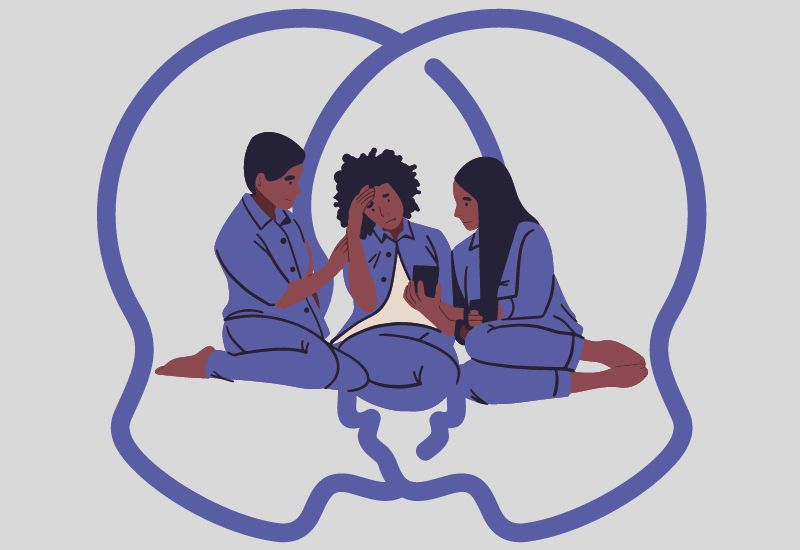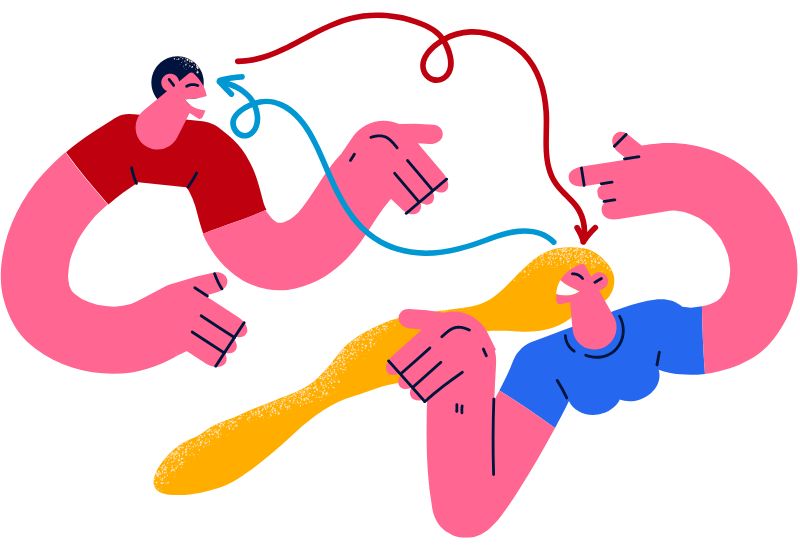- What is Empathy?
- Types of Empathy
- Difference Between Sympathy, Empathy, and Compassion
- The Difference Between Empathy and Being an Empath
- Who is an Empath?
- How to Improve Empathy? 8 Traits of a Highly Empathetic Person
- Why does empathy matter?
- Empathy Quotes
- Frequently Asked Question
- Bottom Line
- Additional Resources
People believe that understanding other people’s feelings and emotions proves one is an emotional fool, but science says otherwise. Empathy builds strong social relations, promotes health, and lowers stress. What is empathy, and why is it important? This question needs to be answered, so let’s begin.
What is Empathy?
Empathy is defined as the ability to understand other people’s emotions and the ability to imagine what someone else might be thinking or feeling. Empathy is crucial in interpersonal and societal relationships, allowing individuals to share their experiences, needs, and desires and providing an emotional bridge that encourages prosocial conduct.
Types of Empathy
Daniel Goleman and Paul Ekman, two well-known psychologists, have identified three types of empathy, each having the desire to understand, feel, assist, and support.
- Cognitive Empathy: The first type of empathy is “cognitive empathy,” which consists of simply knowing how the other person feels and what they may be thinking. This type of empathy can be useful in situations such as negotiations and motivation. When people try to understand another person’s perspective without internalizing his or her emotions, they can become so emotionally detached that they lack the motivation to help that person.
- Emotional Empathy: The second type of empathy is “emotional empathy.” Emotional empathy allows us to understand how another person feels on the inside. According to Hodges and Myers, emotional empathy consists of three basic components. The first is sharing an emotion with another individual. The second component, personal distress, refers to one’s own distress in response to perceiving the plight of another, and the third emotional component is experiencing compassion for another person.
- Compassionate Empathy: “Compassionate empathy” refers to the type of empathy in which we are not only able to understand a person’s situation and share their feelings, but also feel moved to help them when necessary. Ekman identifies compassionate empathy as a skill, the awareness that “we are all connected.”
Difference Between Sympathy, Empathy, and Compassion
Despite these significant differences, sympathy, empathy, and compassion are sometimes used interchangeably.
Empathy is distinct from sympathy. Sympathy is described as an emotional reaction of pity toward the misfortune of another, especially those who are perceived to be unfairly suffering. In contrast, empathy has been defined as an ability to understand and accurately acknowledge the emotions of another, which makes the observer respond in a meaningful way. When we are sympathetic to someone, we may feel sadness for them, but we may not understand exactly what they are going through. In contrast, when we empathize with someone, we are able to understand their feelings and respond in a way that is meaningful and helpful.
Examples of sympathy are “I’m so sorry” and “This must be awful,” on the other hand, examples of empathy include “Help me to understand your situation”
Empathy is also different from compassion, which is more about understanding another person’s problems and responding with kindness and understanding. Compassion is “a way to cultivate the kindness, support, and encouragement necessary to promote the courage necessary to promote the flourishing and well-being of ourselves and others.”
Examples: “I know you are suffering, but there are things I can do to help it be better?”, “What can I do to improve your situation?”
The Difference Between Empathy and Being an Empath
“The Empath is often said to have such a great degree of empathy that they can feel what others feel,” writes Aletheia Luna, author of Awakened Empath. “They intuitively know many of the yearnings, sensitivities, tastes, and even thought patterns of the people they’re around.”
Psychologists may use the term empath to describe a person who exhibits a high level of empathy, frequently to the point of absorbing the pain of others at their own expense.
According to Psychology Today, an empath is a person who can truly feel what others are feeling, both emotionally and physically and experience those emotions as if they were their own, frequently without speaking. Empaths are highly sensitive persons who can even develop panic attacks, depression, and chronic fatigue when overwhelmed by emotion.
Who is an Empath?
Here are 10 indicators that can tell if you are an empath –
- You have very strong intuition when it comes to other people’s emotions.
- You feel and relate to other peoples’ emotions (positive or negative) as your own.
- You experience sudden, overwhelming emotions when you’re in public.
- People turn to you for advice about their problems.
- You are naturally inclined to help others, you have a hard time saying “no” and struggle in setting boundaries.
- You try to avoid confrontation because it hurts your feeling easily.
- You tend to avoid closeness and intimacy because you’re worried you might lose yourself in the relationship.
- You are very sensitive and emotional, and it’s easy for you to get overwhelmed.
- You need your alone time to recharge because you are emotionally drained.
- You feel connected to nature because it gives you a break from all the other things going on in your life.
How to Improve Empathy? 8 Traits of a Highly Empathetic Person
An empathic person is someone who is highly sensitive to the emotions, thoughts, and energies of other people and their environment. Empathetic people are usually very intuitive and can sense what others are feeling, even if they are not aware of it themselves. They can be compassionate, and caring, and understand another’s mental and emotional state.
In the past, empathy was thought to be a trait that you were born with and couldn’t learn. However, research has shown that this essential human skill is mutable and can be taught.
While some people are naturally more empathetic, there are exercises that anyone can do to learn how to be empathetic and become better as they grow. Empathy is an excellent trait everyone should try to have, so how can one improve their empathy? Here are 8 traits of that may help you to recognize your empathy:
1. Acknowledge Your Biases
The first step in being more empathic is recognizing that bias is a natural human tendency, even if we are unaware of it. It is critical to recognize that biases are natural and that no one is immune to having them. There are always ways to stereotype and make assumptions about others based on cultural stigmas and biases. This prevents us from appreciating the uniqueness and individuality of others. We should realize our preconceived notions and biases in our minds so that they do not interfere. Avoid making conclusions about the individual based on your own experiences.
A very simple way to confront our inner bias is to talk to people and understand how they are different from us. A simple conversation with a family member or friend to learn about their day or what they do, will help us learn more about them and understand things from their perspective.
2. Listen Listen Listen
One of the best ways to express empathy is by listening. When we listen to what others say without making assumptions or passing judgment, we can better understand their thoughts and emotions.
Most of the time, we listen to others to respond, not to understand them better. It is crucial not to interrupt the other person when they are talking. Listen to them attentively and ask them relevant questions without passing judgment. This will demonstrate that they are being heard. It is acceptable if you lack a solution to their problems. Sometimes simply being present and listening can make all the difference.
An empathetic listener can be comforting and even helpful for a person with a mental health issue. Understanding a person’s situation will allow you to recommend appropriate resources. Be careful of taking the time to listen before discussing possible actions to take.
3. Genuine Curiosity Enhances Empathy
One trait of an empathic individual is genuine curiosity. They have maintained the natural curiosity we all possessed as children. They may engage in conversations with strangers or observe others with an open mind. We can tailor our responses based on this situation by wondering how another person may be feeling and what he or she may be thinking. Sometimes people may pretend that they care about or relate to your emotions when, on the contrary, they are not interested. Your curiosity drives you to look beyond the obvious, superficial answers and dig deeper into situations—to genuinely ask why until you find the core problems and truly understand the context of an individual’s view and situation. This curiosity facilitates empathy by exposing us to various worldviews, lives, and emotions.
4. Put yourself in someone else’s shoes
Many people judge others without knowing the whole story. Imagine yourself in someone else’s shoes and feeling and seeing the situation from their point of view is one way of helping you to withhold judgment of them. In addition, it allows you to offer comfort and show that you care. Allowing others to feel vulnerable in your presence can open the door to better trust and communication. Immersing yourself in the lives and experiences of others is a great way to increase your empathy.
5. Avoid Comparing Their Problems With Yours
It is essential to understand that all our problems may not be the same and that the ability to tackle challenges differs from person to person. When we have to give our opinion on what we are being told, it is very important to do so constructively, to be honest, and not to hurt anyone. When someone is distressed and shares their problems or vents with you, avoid making statements like “My situation was worse” or “Your situation is at least better than mine!”. These statements hinder your ability to put yourself in the other person’s shoes. When you start comparing, the focus shifts from the other person to you, which is not a sign of empathy.
6. Provide Physical and Emotional Comfort
Understanding one another emotionally and intellectually is not the only necessity for empathy. A hug or a pat on the back can occasionally be a powerful resource for empathic connection. You can use appropriate physical touch to communicate specific, shared emotions. Human touch can also create a neural response that releases mirror neurons, dopamine, and serotonin into the body. Studies have shown that these neurochemicals can boost moods and improve a person’s mental focus.
7. Volunteering
Volunteering is rooted in empathy and amplifies it. Volunteering is an excellent way to put yourself in the shoes of another person. Volunteering broadens your perspective and enables you to see the world through the eyes of others; it strengthens our ability to collaborate with others of diverse backgrounds and points of view, and it promotes understanding and learning. Volunteering enables you to understand and experience what another person is going through since you interact with those who may not be as privileged as you.
Join an NGO and participate in their weekend community service, or attempt to teach a skill to a deserving individual. You will not only impact their lives but also begin to see the world through their eyes, thereby increasing your empathy.

Why does empathy matter?
Empathy, as earlier mentioned, helps us understand how others feel and allows/ guides us to make appropriate decisions in certain situations. It helps us have compassion and relate with the people around us better. Some people find it hard to understand other people’s emotions, primarily those with autism. “I think we all have empathy. We may not have enough courage to display it.”- Maya Angelou.
Empathy is essential in someone’s overall life. It could be your personal life, relationship or, in the workplace.
Empathy In personal life
Mike Robbins mentioned empathy as “one of the most important aspects of creating strong relationships, reducing stress, and enhancing emotional awareness.”
Empathy is also crucial since it is one of the best ways to enhance our relationships, reduce our stress levels, and feel genuinely good about ourselves and our lives. Here are some other advantages of empathy:
- Improves your health (less stress and less negativity which leads people to be in better shape with stronger immune systems)
- Understand the needs of people around you
- Brings about a happier life
- Improves communication skills, fosters teamwork, and promotes a healthy workplace
- Form meaningful relationships
- Reduces negative emotions
- Become a better leader, worker, and friend
Empathy in Relationships
Empathy is essential for forming meaningful relationships with others. Empathy means caring as much about your partner’s well-being as you do about your own, and it can make the difference between a healthy relationship and an unhealthy one.
When we take the time to regularly listen to each other’s thoughts and feelings and understand our partner’s perspectives and respond to their needs in an appropriate way, we can build strong and lasting relationships.
Empathy can also help us navigate difficult conversations in relationships. When we can empathize with someone, we can better understand their point of view and respond in a way that is respectful and meaningful. This can help us maintain healthy relationships and avoid misunderstandings and conflicts.
Empathy in the Workplace
Empathy is one of the most important qualities to have in the workplace. To achieve certain goals, teams must collaborate in the workplace. Teams are made up of a variety of people, and each one is distinctive due to their values, cultural understandings, backgrounds, and perspectives. People in the workplace have different viewpoints and beliefs. Empathy is important in the workplace because it enables you to take the time to understand everyone’s perspective without passing judgment or feeling superior to them. Empathy also enhances communication, strengthens working relationships, and promotes creative thinking. Additionally, if you are the manager at your workplace, you should be compassionate with your employees. Employees frequently perform better when their managers foster a positive and supportive work environment. This could promote teamwork, productivity, and a positive work atmosphere.
90% of US workers believe that empathetic leadership increases job satisfaction, and 79% believe that it decreases the likelihood of people quitting their positions, according to a recent survey by EY Consulting.
An astounding 89% of workers agree that empathy improves leadership. In fact, 88% of respondents believe that empathetic leadership encourages positive change in the workplace, and 87% believe that it promotes trust between employees and the leader. Additionally, 85% of respondents claim that empathetic leadership in the workplace improves worker productivity.
We can navigate challenging conversations at work with the help of empathy. When we are able to empathize with our colleagues, we are better equipped to understand their points of view and provide thoughtful respectful responses. This can help us maintain healthy relationships and constructively resolve conflicts.
Empathy and Mental Health
According to the WHO, mental health is an important part of overall well-being as it enables people to realize their full potential, show resilience amidst adversity, be productive across the various settings of daily life, form meaningful relationships, and contribute to their communities.
Empathy is also essential for understanding and managing our own emotions. When we take the time to understand how we are feeling, we can better manage our emotions and respond in a way that is healthy and productive.

Empathy Quotes
If you enjoyed this article, check out some inspirational Empathy quotes.
The biggest deficit we have in our world and society is an empathy deficit. We are in great need of people being able to stand in somebody else’s shoes and see the world through their eyes.
Barack Obama
Looking at various means of developing compassion, I think empathy is an important factor: the ability to appreciate others’ suffering.
Dalai Lama
When you show deep empathy toward others, their defensive energy goes down, and positive energy replaces it. That’s when you can get more creative in solving problems.
Stephen Covey
Empathy is the greatest virtue. From it, all virtues flow. Without it, all virtues are an act.
Eric Zorn
When you start to develop your powers of empathy and imagination, the whole world opens up to you.
Susan Sarandon
Frequently Asked Question
Being empathetic means being able to understand and share the feelings of another person. It involves being able to put ourselves in someone else’s shoes and to gain insight into their perspective. It also involves being able to respond in a way that is appropriate and meaningful. Some individuals are naturally more empathetic than others. Here are several indications of a strong feeling of empathy:
- You pay close attention to what others are saying.
- Usually, you can tell whether a person is depressed, nervous, or furious.
- You frequently take the emotions of others and experience them yourself.
- You make an attempt to understand the thoughts and feelings of others.
- Being around dishonest individuals is difficult.
- You find it tough to deal with situations that are emotionally demanding.
- People tend to approach you with problems and ask for assistance.
What is sympathy vs empathy?
Sympathy is feeling sorrow or pity for someone else’s suffering, while empathy is being able to put yourself in their shoes and feeling what they’re feeling. It’s a deeper, more meaningful connection to someone’s emotions and experiences. Sympathy is often more passive, whereas empathy is active — you take action in order to understand someone else’s situation. To truly connect with someone’s emotions, empathy is the key.
What makes someone lack empathy?
According to research various factors including genetics perceived social standards, and life events, seem to lead to a lack of empathy. Some people may be born without the capacity to empathize or with a disorder that affects their ability to empathize. Additionally, a person’s upbringing can play a role. If a person is raised in an environment that discourages empathy, they may exhibit a lack of this quality as they age. Lastly, life experiences can also shape an individual’s empathy ability. A person who has had a traumatic experience may be less likely to recognize and share others’ emotions. Some disorders, including narcissistic personality disorder (NPD), antisocial personality disorder (APD), and borderline personality disorder (BPD), may also lead to a lack of empathy.
Do narcissists have empathy?
Narcissists may exhibit behaviors that appear empathetic, but they are actually motivated by a desire to be viewed positively. For instance, a narcissist may offer a compliment or express sympathy, but they do so with the purpose of enhancing their own self. When trying to manipulate a situation to their own advantage, narcissists may often appear empathetic. While narcissists may occasionally exhibit behaviors that appear empathic, they lack the capacity to understand and share the feelings of others. In the end, they simply have their own interests in mind.
What is an example of empathy?
Empathy refers to the capacity to recognize, identify, and understand another person’s feelings, as well as the ability to relate to and feel those emotions. It is frequently used in counseling and therapy to help people understand their emotions, perspectives, and challenges. It is also used in daily life to develop relationships and promote understanding. For instance, if a colleague is upset, you can exhibit empathy by listening to their feelings, understanding why they are sad, and showing compassion. Empathy is a powerful resource that can assist in the formation of solid relationships and promote greater understanding.
Bottom Line
Empathy helps us develop meaningful connections, navigate challenging conversations, and manage our own emotions. It involves understanding and sharing another’s feelings and responding appropriately.
Listen actively, put yourself in the other person’s shoes, ask questions, show compassion, take your time, and exercise self-care to cultivate empathy.
Additional Resources
Riess H. The Science of Empathy. J Patient Exp. 2017 Jun;4(2):74-77. doi: 10.1177/2374373517699267. Epub 2017 May 9. PMID: 28725865; PMCID: PMC5513638.
Sinclair S, Beamer K, Hack TF, McClement S, Raffin Bouchal S, Chochinov HM, Hagen NA. Sympathy, empathy, and compassion: A grounded theory study of palliative care patients’ understandings, experiences, and preferences. Palliat Med. 2017 May;31(5):437-447. doi: 10.1177/0269216316663499. Epub 2016 Aug 17. PMID: 27535319; PMCID: PMC5405806.















